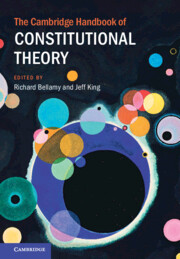Book contents
- The Cambridge Handbook of Constitutional Theory
- The Cambridge Handbook of Constitutional Theory
- Copyright page
- Contents
- Figures
- Contributors
- Frontispiece
- Preface and Acknowledgements
- 1 Introduction
- Part I Values
- Part II Modalities
- Part III Institutions
- Part III. A The State
- 30 The State
- 31 The Material Constitution
- 32 Federalism
- 33 Consociationalism
- 34 Corporatism
- 35 Guarantor (or the So-called “Fourth Branch”) Institutions
- 36 Central Banks
- Part III. B The Executive
- Part III. C The Democratic System
- Part III D The Legal System
- Part III E The Global System
- Part IV Challenges for Constitutional Democracy
- Bibliography
- Index
- References
34 - Corporatism
from Part III. A - The State
Published online by Cambridge University Press: 27 March 2025
- The Cambridge Handbook of Constitutional Theory
- The Cambridge Handbook of Constitutional Theory
- Copyright page
- Contents
- Figures
- Contributors
- Frontispiece
- Preface and Acknowledgements
- 1 Introduction
- Part I Values
- Part II Modalities
- Part III Institutions
- Part III. A The State
- 30 The State
- 31 The Material Constitution
- 32 Federalism
- 33 Consociationalism
- 34 Corporatism
- 35 Guarantor (or the So-called “Fourth Branch”) Institutions
- 36 Central Banks
- Part III. B The Executive
- Part III. C The Democratic System
- Part III D The Legal System
- Part III E The Global System
- Part IV Challenges for Constitutional Democracy
- Bibliography
- Index
- References
Summary
Corporatism refers to the tradition of constitutional theories that argue that self-organized bodies, such as universities, churches, or labour unions, are independent and important components of a constitutional order. While in the twentieth-century corporatism became associated primarily with economic actors, a central question in corporatist theory was the broader constitutional status of non-state associations and organizations that had their own political powers to govern their members and engage in quasi-legislative activity. In arguing for the independent legitimacy of such diverse corporate actors, proponents of corporatism were united in criticizing more liberal visions of constitutionalism for its abstraction and formalism. Many corporatist theorists thus advocated a sort of societal constitutionalism, where constitutional norms are embodied in diverse institutions that are more proximate to individuals than the state – ranging from major professional and economic associations to a variety of civil society groups. This chapter analyses corporatism both as a tradition in constitutional theory and as an empirical phenomenon that arose in the interwar and post-war periods. It argues that corporatist ideas can contribute to a theory of democratic constitutionalism that emphasizes the importance of organized collective power, and not just the problem of regulating state coercion or distributing formal rights.
Keywords
- Type
- Chapter
- Information
- The Cambridge Handbook of Constitutional Theory , pp. 585 - 602Publisher: Cambridge University PressPrint publication year: 2025

